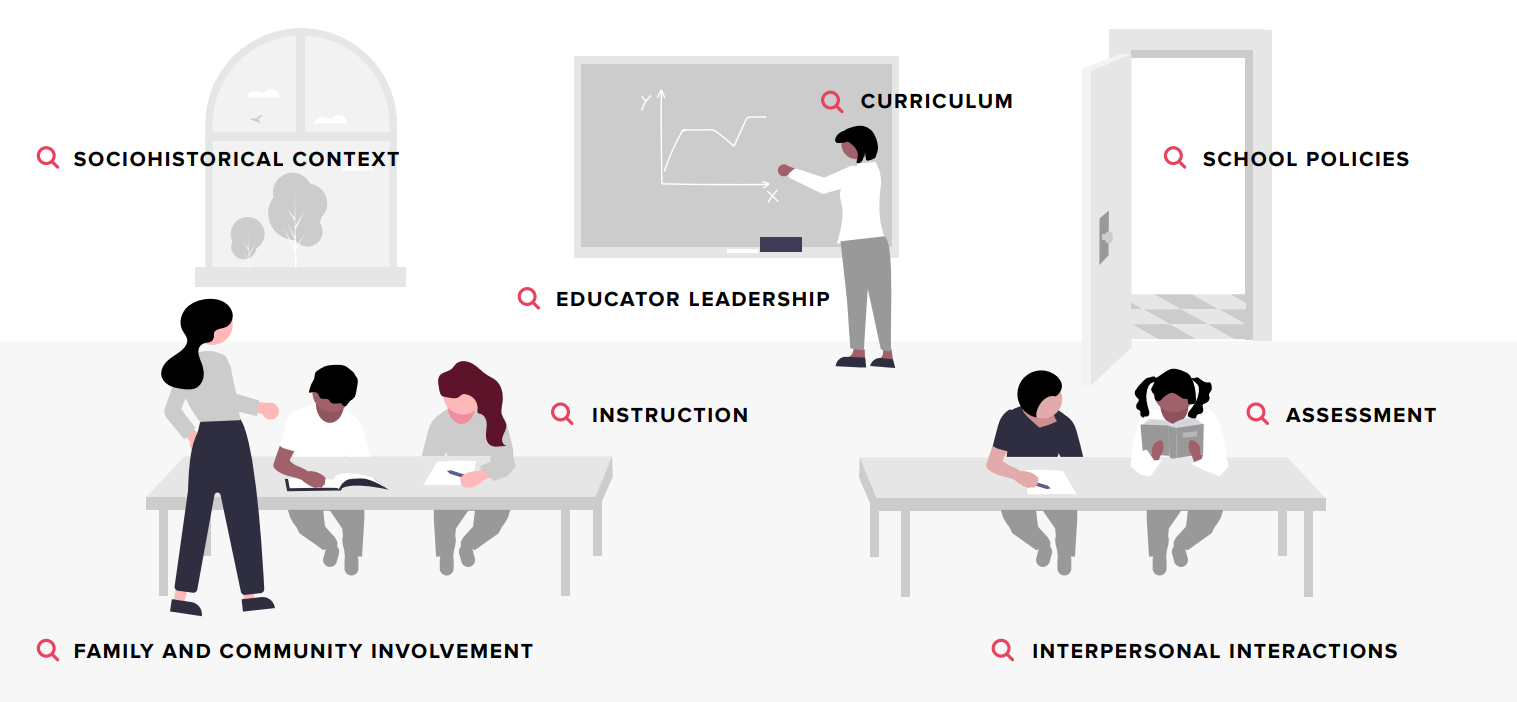Findings from the Inclusive Mathematics Environments Early Career Fellowship
Chloe Stroman
Earlier this month, we shared five guiding principles for creating inclusive mathematics environments. These guiding principles emerged from the Student Experience Research Network Inclusive Mathematics Environments Early Career Fellowship, in which 11 early career scholars reviewed and synthesized decades of research about students’ experiences with and perceptions of mathematics in middle childhood through mid-adolescence.
Together, the fellows’ syntheses highlight key features of the environment that support student learning and well-being in mathematics, particularly for students from groups that have been minoritized and marginalized in mathematics. As outlined in the guiding principles, these features include: critical consciousness among educators, a more expansive understanding of the discipline of mathematics, adaptable curriculum and instruction that allows for relevance for the specific students in a class, meaningful opportunities to engage in collaborative work, and assessment that prioritizes deep mathematical thinking and exploration.

Click the image to view our one-pager illustrating how the mathematics environment can shape student experience.
Today, we are excited to share the papers that were authored during the fellowship. One fellow, Nicole Williams Beechum, produced a report that looks across fellows’ projects and summarizes insights for education practice and policy audiences. Ten fellows produced academic manuscripts which dive more deeply into the topics listed above.
Research report: Expanding visions of success in mathematics for marginalized students: Building more equitable and inclusive mathematics environments.
Fellow: Nicole Williams Beechum, University of Chicago Consortium on School Research
Mentor: Camille Farrington, University of Chicago Consortium on School Research
Agarwal (2020). Disrupting gendered epistemic injustice in K-12 mathematics – A research synthesis.
Fellow: Priyanka Agarwal, University of Wisconsin–Madison
Mentor: Tesha Sengupta-Irving, University of California, Berkeley
Chen & Horn (2020). Reviewing the research on marginalization in mathematics education.
Fellow: Grace Chen, Vanderbilt University
Mentor: Ilana Horn, Vanderbilt University
Gladstone & Cimpian (2020). Role models can help make the mathematics classroom more inclusive.
Fellow: Jessica Gladstone, New York University
Mentor: Andrei Cimpian, New York University
Johnson (2020). Social class, culture, and the reproduction of inequality in collaborative experiences among college students in STEM. (embargoed)
Fellow: Anthony Johnson, The Ohio State University
Mentor: Jennifer Langer-Osuna, Stanford University
Fellow: Kathryn Kroeper, The Ohio State University
Mentor: Mary Murphy, Indiana University
Fellow: Dana Miller-Cotto, University of Delaware
Mentor: Neil Lewis, Jr., Cornell University
Ortiz (2020). (Ontologically) Black and proud.
Fellow: Nickolaus Ortiz, Georgia State University
Mentor: Nathan Alexander, Morehouse College
Fellow: Stacy Priniski, Michigan State University
Mentor: Dustin Thoman, San Diego State University
Fellow: Matthew Voigt, San Diego State University
Mentor: Daniel Reinholz, San Diego State University
Fellow: Charles Wilkes II, University of Michigan
Mentor: Deborah Loewenberg Ball, University of Michigan
We at Student Experience Research Network are thrilled to celebrate the fellows’ exceptional work and to share this collection of knowledge about creating inclusive mathematics environments.
The fellowship was led by Shanette Porter, SERN Director of Research and Senior Fellow, and Tanner LeBaron Wallace, professor at the University of Pittsburgh. Advisory team members included Deborah Loewenberg Ball (University of Michigan), Maisie Gholson (University of Michigan), DeLeon Gray (North Carolina State University), Luis Leyva (Vanderbilt University), Jamaal Matthews (University of Michigan), and Na’ilah Nasir (Spencer Foundation).
The fellowship was funded by a grant from the Bill & Melinda Gates Foundation. The findings and conclusions in fellows’ papers are those of the authors and do not necessarily reflect positions or policies of the foundation.
This work is licensed under a Creative Commons Attribution-NonCommercial-NoDerivatives 4.0 International License.